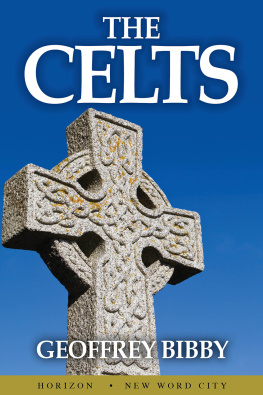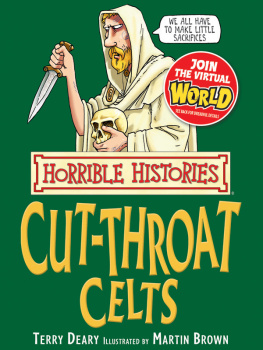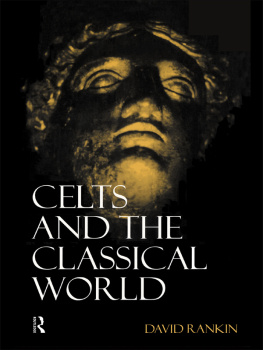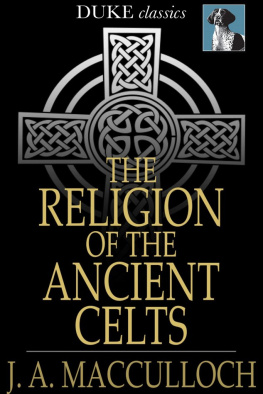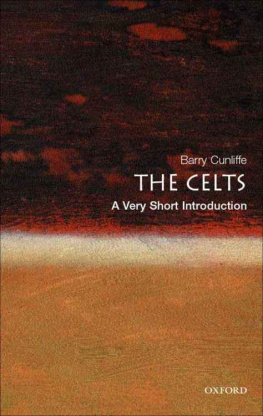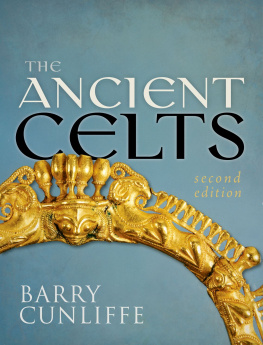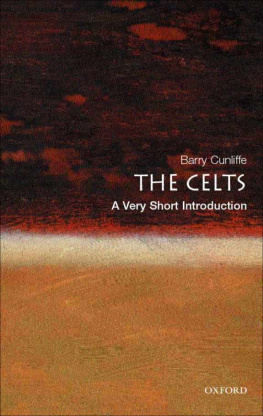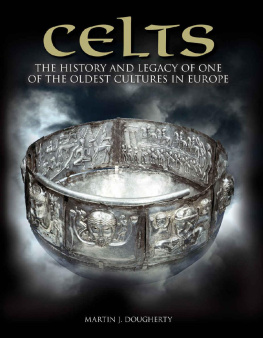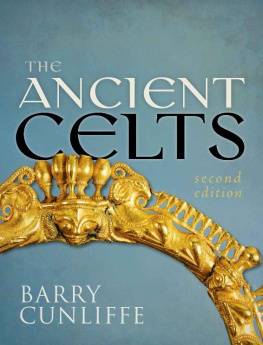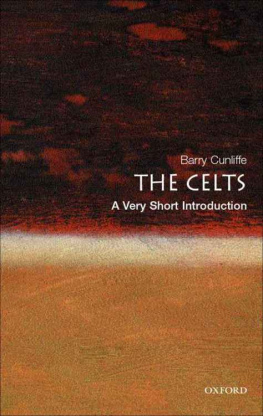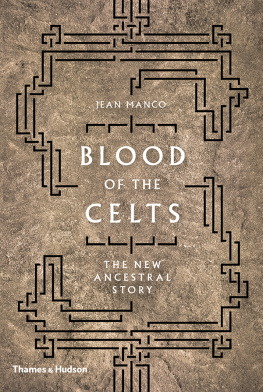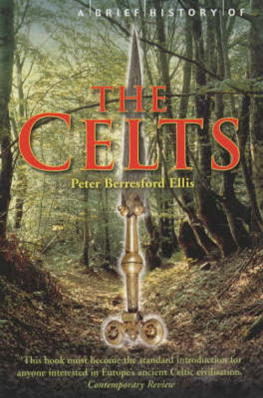Geoffrey Bibby - The Celts
Here you can read online Geoffrey Bibby - The Celts full text of the book (entire story) in english for free. Download pdf and epub, get meaning, cover and reviews about this ebook. year: 2014, publisher: New Word City, Inc., genre: Art. Description of the work, (preface) as well as reviews are available. Best literature library LitArk.com created for fans of good reading and offers a wide selection of genres:
Romance novel
Science fiction
Adventure
Detective
Science
History
Home and family
Prose
Art
Politics
Computer
Non-fiction
Religion
Business
Children
Humor
Choose a favorite category and find really read worthwhile books. Enjoy immersion in the world of imagination, feel the emotions of the characters or learn something new for yourself, make an fascinating discovery.
- Book:The Celts
- Author:
- Publisher:New Word City, Inc.
- Genre:
- Year:2014
- Rating:4 / 5
- Favourites:Add to favourites
- Your mark:
- 80
- 1
- 2
- 3
- 4
- 5
The Celts: summary, description and annotation
We offer to read an annotation, description, summary or preface (depends on what the author of the book "The Celts" wrote himself). If you haven't found the necessary information about the book — write in the comments, we will try to find it.
The roving Celts struggled and traded with the Greeks and Romans for centuries. With no written language or any sense of nationality, the Celts nevertheless were bearers of a distinctive, rich, and influential culture. Here, in this short-form book from the renowned archeologist Geoffrey Bibby, is their story.
The Celts — read online for free the complete book (whole text) full work
Below is the text of the book, divided by pages. System saving the place of the last page read, allows you to conveniently read the book "The Celts" online for free, without having to search again every time where you left off. Put a bookmark, and you can go to the page where you finished reading at any time.
Font size:
Interval:
Bookmark:
In the story of every country and region of the world exists a twilight zone, a period of half-light that precedes the dawn of history. For history, with its peoples and kings, its battle sites, its dates and descriptions, starts when contemporary events are first chronicled. For the period before written records, we have only the legends, folk traditions and genealogies, myths and customs that were current at the time of the first historians, and then, only as much of those as historians thought worth recording. These myths and legends contain some truth and some poetic invention - but we seldom know which is which. Sometimes we can find clarity through studies of language or of place names or through chance references by earlier historians, but such oblique light often casts as many shadows as it dispels.
Nowhere is this twilight zone more tantalizing than in the hinterland of Europe. North of the Alps and the Balkans, history dawns with the expansion of the Roman Empire in the first century B.C. If we look beyond this dawn, we see the vague outline of the Celts. Several centuries before the birth of Christ, while Greece and then Rome were extending their sway over the Mediterranean world, Celtic tribesmen swept across northern Europe from the Black Sea to the Atlantic, asserting dominion over native inhabitants wherever they could. Considered barbarians by the classical world, these warlike people nevertheless were carriers of a distinctive enduring culture that is still discernable today.
That the Celts have stayed in the half-light is entirely their fault, since they are silent about their history. For at least 500 years, they existed on the borders of a variety of nations possessing developed literary and historical traditions and easily assimilated, written languages. The Celts never developed a written language of their own, never borrowed one, and never wrote anything down while they existed as a people. Our only historical evidence of the Celts comes from what people in other nations wrote about them.
About 500 B.C., the Greek historian Hecataeus of Miletus mentions that the Greek colony of Marseilles lies in the territory of the Ligurians close to the country of the Celts. Some fifty years later, Herodotus , who gives us detailed accounts of other countries and peoples of the ancient world, briefly reports that the source of the Danube lies in Celtic territory near Pyrene, which is believed to be the Pyrenees. He adds that the Celts are the most westerly of the Europeans except for the Cynetes , who apparently occupied the southern part of Portugal.
Not much later, the Celts erupt into history. In 425 B.C., four tribes from beyond the Alps invade northern Italy, and thirty-five years later, they sack Rome. Although the Romans call these invaders Gauls (Galli), Julius Caesar later tells us that the tribes the Romans call Galli call themselves Celtae. The Celts were a power north of the Alps thirty years before Caesars revelation, and moreover, they were in a state of ferment. In the fourth century B.C., Ephorus , another Greek historian, lists them as one of the four great barbarian peoples of the world, along with the Ethiopians , Indians , and Scythians . About the same time, bands of Celtic warriors are serving as mercenaries in Greece. In the meantime, Gallic raids in Italy continued, and Celts from Gaul were fully settled in the valley of the Po and around the head of the Adriatic, where Celtic envoys are reported leaving to meet Alexander the Great when he was campaigning in Bulgaria in 335 B.C.
Almost sixty years later, three Celtic tribes, calling themselves by the common name of Galatians, descended into Macedonia with their families and wagons in the middle of the winter of 280 B.C., looting and seeking to settle. In the following year, they sacked Delphi , but were defeated. They crossed to Asia Minor, where after a period of widespread raiding, they settled down in the region of present-day Ankara , then known as Galatia .
This raid of 279 B.C. appears to have been a last desperate venture by a tribal confederacy forced to find a new home. For the next 200 years, the Celts were on the defensive, gradually losing ground. In 225 B.C., at Telamon , the Romans decisively defeated the Celts - they continued to call them the Gauls - of northern Italy and their confederates north of the Alps, and in 192 B.C., with the capture of Bologna, Rome extended her rule over all the Gauls of the Po valley. Nearly seventy years later, in 124 B.C., the Romans conquered Provence, the area closest to Italy inhabited by the Gauls beyond the Alps. And nearly seventy years after that, in 58 B.C., Julius Caesar began the seven-year campaign that reduced Gaul to a Roman province.
MEANWHILE, HOWEVER, THE Celts in Gaul had been under attack from the north. In 115 B.C., three migratory peoples - the Cimbri , the Teutones , and the Ambrones - descended upon the Boii , a Celtic tribe in Bohemia, and were repulsed with difficulty. They then moved slowly westward through Celtic territory, plundering and crushing any opposition. There were probably other raids upon the Celts from the north, but we can see the impact of the Cimbri and the Teutones for they pressed deep enough into Celtic territory to meet the Romans and find a place in Roman history. The Romans classified them as Germanic peoples from Denmark. They impressed the Romans by defeating three Roman armies on the northern side of the Alps, first in Austrian Carinthia in 113 B.C. and twice again in southeast France, in 109 and 105 B.C. Then, Roman historians say, the Cimbri moved on to Spain but returned three years later with plans to invade Italy. Now they were defeated by the Roman dictator Gaius Marius in two great battles in 102 and 101 B.C. Their defeat was evidently so decisive that those who escaped death or slavery was no longer of political or military significance.
Nevertheless, pressure upon the Celts from both the north and the east seems to have continued. In Caesars description of Gaul in the fifties of the first century B.C., he divides Gaul into three parts: the southwest, inhabited by the Aquitani ; the center, inhabited by the Celts; and the northeast, inhabited by the Belgae . The Germanic Belgae, he says, had come from across the Rhine.
Thats as much as we know of the Celts from classical sources. It appears that throughout the last 500 years before Christ, they were the most important group in Europe, occupying the area north of the Alps from Czechoslovakia in the east to the Pyrenees in the west. From this area, their tribes pushed out sporadically to raid, and where the opposition was not too great, settled in Greece, Italy, Spain, and beyond.
Two points need emphasis. No classical author ever described the inhabitants of England, Ireland, Scotland, or Wales as Celts, and prior to the eighteenth century, the people of those countries never refer to themselves as Celts. Ireland, Scotland, and Wales are now regarded by their inhabitants and the rest of the world as the last stronghold of the Celts. Are these people the cultural descendants of the barbarians who sacked Delphi and struggled against the legions of Rome so many centuries ago? Who were the Celts?
Clearly, the Celts were not a nation in the modern sense; the Greeks and Romans recognized many tribes in the European hinterland as Celts. There were also many tribes seen as non-Celts, some classified by the Romans as Germani . Those called Celts did not constitute a political entity. They had no common ruler or federal organization, and they did not act in concert. Some were at peace with Rome, while others were at war - at times with each other.
They apparently had a common language, but it was also spoken by other peoples. The chieftains of the Cimbri and the Teutones, sworn enemies of both Celts and Romans, bear Celtic names. So do the Belgae of northeast Gaul, who according to Caesar, prided themselves on their Germanic, non-Celtic origin. It is unclear if all the Celts spoke Celtic. In fact, it appears that the term Celt had no linguistic, ethnic, or national connotation.
Next pageFont size:
Interval:
Bookmark:
Similar books «The Celts»
Look at similar books to The Celts. We have selected literature similar in name and meaning in the hope of providing readers with more options to find new, interesting, not yet read works.
Discussion, reviews of the book The Celts and just readers' own opinions. Leave your comments, write what you think about the work, its meaning or the main characters. Specify what exactly you liked and what you didn't like, and why you think so.

